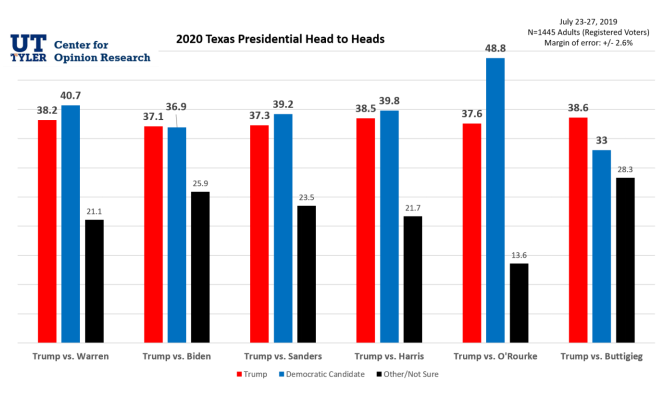I suppose I have to talk about this.
A poll conducted by the Center for Opinion Research at the University of Texas at Tyler showed [Beto O’Rourke] leading among Texas voters in the Democratic presidential primary. The survey showed O’Rourke with a 27% to 24% lead over former Vice President Joe Biden. Vermont Sen. Bernie Sanders was third at 15%, followed by Massachusetts Sen. Elizabeth Warren at 11% and California Sen. Kamala Harris at 9%.
The poll of 465 registered Texas voters found that O’Rourke led President Donald Trump in a head-to-head matchup by a 49% to 37% margin.
You can see a copy of the polling memo here and the data here. I’ll note that the poll itself says it’s a sample of 1,445 registered voters, so I’m not sure where that 465 figure comes from. Here’s a bit from the polling memo:
President Donald Trump’s job approval is down 2 points from our last survey in February. It now stands at 40 percent approval and 55 percent disapproval among all registered voters. These results are a part of an overall downward trend in job approval for the president since our pre-midterm election survey in October 2018 (45 percent approval and 44 percent disapproval). That said, when asked if the House of Representatives should or should not begin impeachment proceedings of President Trump, a plurality of respondents (45%) said, “No” (34% believe the House ought to begin impeachment proceedings).
In head to head contests, President Trump is trailing all Democrats except Joe Biden and Pete Buttigieg, though a sizable percentage of respondents answered “neither/other” or “not sure” in each contest.
Senator John Cornyn, heading into the 2020 reelection cycle, is at 25 percent approval, with 27 percent disapproving and a sizable 48 percent answering, “Don’t know.” His junior colleague, Ted Cruz, has a 41 percent approval rating, with 44 percent disapproving of his job performance.
On issues, 54 percent of registered Texans support expanding “Medicare for all” (20% oppose it), particularly when private insurance plans are allowed (55% support). Nevertheless, expanding “Medicare for all” while eliminating private insurance plans is less popular (40% support eliminating private insurance, 33% oppose it). So, too, is the idea of decriminalizing unauthorized border crossings (33% either “somewhat” or “strongly” disapprove while 29% “somewhat” or “strongly” approve), an issue that caused a contentious exchange between Texans O’Rourke and former Secretary of Housing and Urban Development Julian Castro at June’s Democratic debate.
This poll was conducted over a four-day period (07/24/19 – 07/27/19).
Methodology
The UT Tyler-Texas Opinion Survey was conducted using a Dynata panel of registered voters that opt-in to take surveys. This is known as Aristotle. The online panel generated a sample of 1445 registered Texas voters, 18 or older.
The data were weighted to be representative of Texas adults. The weighting balanced sample demographics to population parameters. The sample is balanced to match parameters for gender, age, race/ethnicity, education, and geographic region using an iterated process known as raking. These parameters were derived from 2016 Current Population Survey Voting and Registration Tables, as well as voter registration information from the Texas Secretary of State’s Office. The use of these weights in statistical analysis ensures that the characteristics of the sample closely reflect the characteristics of registered voters in Texas.
In this poll, the sampling error for 1445 registered voters in Texas is +/- 2.6 percentage points at a 95 percent confidence interval.
Online polls have been shown to be fine, but I don’t know much about this particular pollster’s reputation. Here’s the key graphic from that polling memo:
Seems weird to me – I can imagine Beto doing better in Texas than some candidates, but not by this much. G. Elliott Morris notes his objections. I don’t have a problem with an RV sample, especially this early on, but the partisan mix (38.2% self-identified Republican, 35.7% Dem) seems too Democratic to me. Trump’s 40-55 approve-disapprove numbers are considerably more negative than any other poll I’ve seen, and are way more negative than this own poll found just before the 2018 election. Their February poll had only slightly better numbers for Trump. It’s hard to imagine what caused that to go that far down that quickly. The most likely explanation to all of this is that they have a screwy sample, in which case have plenty of salt at hand. If they really are capturing something, there will be more polls to bolster this one. Keep your expectations modest, that’s my advice.
Anyway. The UT Tyler Center for Opinion Research page is here if you want to see more. Enjoy these numbers for what they are, but don’t go making any bets on them.

